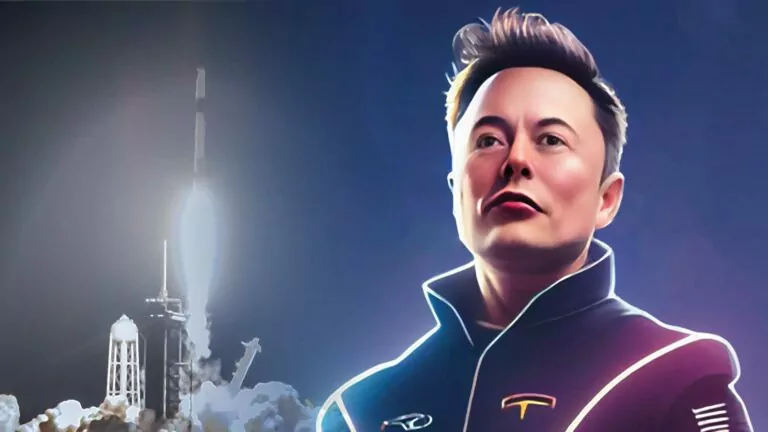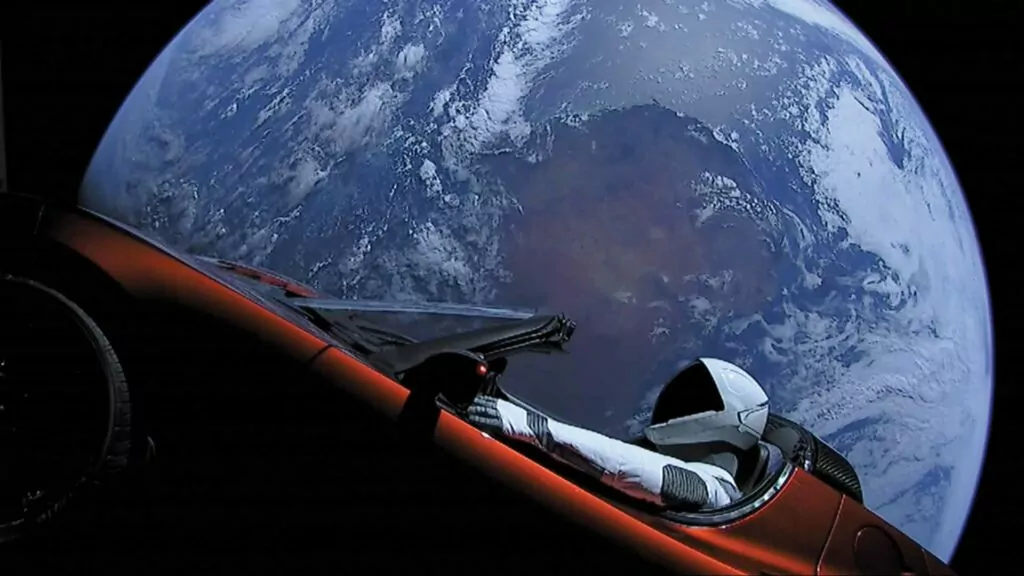“These human space flight missions were a beacon of hope to me and to millions over the past two years as our world has been going through one of the most difficult periods in recent human history. We see the rise of division, fear, cynicism, and the loss of common humanity, right when it is needed most. So, first, Elon, let me say thank you for giving the world hope and reason to be excited about the future.”
– Lex Fridman speaking about SpaceX to Elon Musk, on his podcast released December 28, 2021
****
Where are the dreams of previous decades, of flying cars and paperless offices and TV phones? Not only have these dreams turned out to be rather bleak (Zoom as a sort of TV phone has not sparked joy in anyone), but no new visions of the future have sprung up to replace them. Young people – those supposedly optimistic young people – fill social media feeds with anxiety-soaked visions of climate catastrophe, plague and economic collapse. Our world dreams of catastrophe, not progress.
And yet some young people do turn to one figure as a beacon of hope in the negativity all around them. They turn to a public figure who frequently and publicly describes a future where humanity overcomes its challenges, and continues to seek out the meaning of existence. This is the vision of the future provided by Elon Musk – a controversial figure whose “true fans” love him for his insistence that human ingenuity can create a future that will be better.
Christians, of all people, have reason to be excited about the future. We live in hope, even in the midst of darkness and despair. Or so we say. And yet it is not Christianity that many turn to, to escape the bleak future. It is not Christianity that provides these young fans with a new vision of the future, and an optimism to be hopeful again.
When we see the success of visionary dreams of the future, when we see Elon Musk inspiring millions, it pushes us as Christians to work out what we mean by hope. It pushes us to define what we expect from the future. And it urges us to consider whether we are “visionary,” and whether we should be.
The profound hopefulness of Elon Musk
“You want to wake up in the morning and think the future is going to be great—and that’s what being a spacefaring civilization is all about. It’s about believing in the future and thinking that the future will be better than the past. And I can’t think of anything more exciting than going out there and being among the stars.” – Elon Musk, SpaceX website
What is Elon Musk’s vision? Musk has many critics, including many who doubt he sincerely means to benefit common humanity with his companies and inventions. Despite this, fans continue to flock to him. Whether or not his vision of the future is sincere or a marketing tactic, the simple fact is that there is something in his vision that fulfills something his fans are looking for. They draw hopefulness from his vision. Why is that?
First of all, Musk has the ability to drag unlikely concepts, like reusable rockets, into the realm of reality. For a young generation struggling with anxiety, just getting out of bed in the morning can feel superhuman. A person who can come up with an idea, and then make sure that idea gets done, confronts our feelings of helplessness and comforts us that maybe solving our problems is as simple as just doing it. “When something is important enough, you do it, even if the odds are not in your favor,” as Musk says in his interview with Lex Fridman.
On one level, Musk is not that revolutionary. Electric cars, space flights to Mars, satellite internet – all of these are ideas that have been dreamed up before Musk came along. But because Musk has done more than dream, Musk has become a source of inspiration.
But Musk doesn’t simply get things done – he frames his activities as the stuff that fires imaginations. “You need to have things that when you wake up in the morning, you’re excited about the future,” Musk argues in another interview with the Babylon Bee. “Why live? If it’s all about solving problems of being miserable, like, why live? So they’ve got to be things that…you know, get you in the heart. And I think space is one of those things.”
God created a world with much more than the bare necessities. He also created a people with a capacity for enthusiasm – an enthusiasm to explore, an enthusiasm to see what is possible. We can be full of curiosity about creation, just as scientists before us reached out to God through their discoveries of the natural world. Haven’t Christians who have come before have been eager to explore and create? From Johannes Kepler to David Livingstone, the world has opened up to us through the enthusiasm of those who have come before us.
The Bible itself illustrates this too. The overall arc of the Bible moves from its beginnings in the garden to its ending in the city. The story of creation is a story that includes the development and unfolding of what God made. This is why we need dreamers and visionaries, to bring out the possibilities inherent in creation.
Elon Musk hits on some important things. Building real things in the real world matters, even if it isn’t easy to bring things together and make them work together. In fact, building real things can contribute to a feeling of fulfillment in us, a feeling of doing what we were meant to do. No wonder some find inspiration in this.
But Musk himself is used as the example to follow for those looking for a hopeful outlook on the future. As a man who presents himself as someone who dreams and builds his dreams, he is viewed as an inspiration. This means the vision he presents should be examined in more depth. Before we fully jump on board with Elon Musk’s future, we should consider what future, exactly, he presents.
The bleakness of Elon’s future
Elon Musk claims to want to build the future so humans can continue to seek the meaning of life.
“I don’t know when I’ll die, but I won’t live forever. But I would like to know that we are on a path to understanding the nature of the universe and the meaning of life and what questions to ask about the answer that is the universe.”
Musk wants to save humanity so humanity can continue to struggle with the meaning of existence. Well and good! Humans are meant to seek out the purpose of their existence, and not give up on their existence as meaningless. But Musk himself holds back from offering an answer to the question of meaning, only vaguely hinting that humanity might figure it out in some far-off someday. And in this way, Musk’s future does not fully alleviate the temptation to nihilism.
After all, what does he really think the nature of the universe is?
He is building physical technologies that will greatly impact the real world we live in. But he is deeply ambivalent about whether the world we live in is a real world after all. “The odds that we’re in base reality is one in billions,” he explained at Code Conference in 2016. It’s a fun idea that tech entrepreneurs and philosophers like to play with – the idea we might be living in a video game that is a copy of some deeper reality. Except this idea of “what’s really going on” is cold comfort to the apathetic and despairing.
And Musk is, famously, all-in on artificial intelligence, as well as linking our brains to computers (see his company Neuralink). This does indicate a belief that reality may really not consist of anything more than ones and zeros after all.
If we are living in a simulation, a cosmic simulation where something is jerking us around like puppets – well, some of us might be eager to know the truth of this. But this truth is not the kind of truth that sets us free from apathy. Musk does not know what the meaning of life is. He only wants to buy more time for humanity to figure it out.
The answer to the meaning of existence that many people arrive at today, when looking at the failures of humanity, is simply that humanity does not deserve to exist. This is what feeds into our current culture’s apathy. And no journeys among the stars are fantastic enough to change their minds.
In some sense, Elon Musk is right. What makes life worth living is working on problems, seeking the meaning of existence, and exploring every cranny of creation. Only Christians can fight with those problems before the face of a God Who has answers.
Saving us from the future?
Do Musk’s fans really turn to him because of his musings about reality being a simulation, or because of his goal of preserving human consciousness in order to seek out the meaning of life? It is possible they turn to him for a far simpler reason than this. For some of them, it may be less about finding positive inspiration in his message, and excitement for the future – and more of a response to fear of the future.
Fear of the future is behind so much of human activity. As Dietrich Bonhoeffer said in a sermon in 1933, “What else is all the razzle-dazzle and drunkenness of New Year’s Eve, other than our great fear of a new era, of the future? Fear is breathing down our necks.”
Elon Musk’s vision is a relief because it offers a positive vision of the future, in contrast to the terrible ones on the news every day. It acknowledges terrible consequences that may occur, but it encourages us that humanity can overcome them. By being hopeful, it helps others to hang onto hope. And this relief from fear brings devotion along with it.
After all, is it really self-evident that space travel is inspiring, and is that truly what his fans latch onto when they admire Musk? Going to Mars is presented with the enthusiasm that the age of exploration brought, when voyages to unknown lands brought home wonders. Except in our case, Mars is not exactly unknown or unexplored. The magic of going there is to just say we can go there, to say humans have set foot on a place we already know all about – more like a family vacation to Paris than a voyage of discovery to the South Seas.
To make it even more prosaic, the reason to go there is “a life insurance policy.” Musk presents his technology as supplying a reason to get up in the morning and feel optimistic about the future, but he simultaneously does not shy away from arguing his work will preserve humanity in case something really bad happens to earth. He says, “We should basically think of this, being a multi-planet species, just like taking out insurance for life itself – like, life insurance for life.” (“This turned into an infomercial real quick,” says his interviewer, Lex Fridman).
His focus on using technology to avoid potentially devasting problems, such as climate change, helps explain why he is so often viewed as a savior by the devoted.
To explore out of a love of exploration, out of a joy of living, is quite different than to explore and build to avoid a negative outcome. To the extent Elon Musk’s vision is driven by a joy of discovery, it is admirable. To the extent it reveals humanity’s underlying fears and insecurities, it reveals a drive to control and secure our own futures.
Looking to technology to solve all our problems and absolve us of our fears quickly becomes placing our faith in technology – in other words, placing our faith in humankind. Ideally, we recognize the capabilities God has given to humanity, while simultaneously recognizing their source in God. Otherwise the failures of humanity can feel overwhelming, as demonstrated by our current culture’s reaction to the optimism of the 1950s. Nihilism and apathy are much more common, despite the technological progress of the twentieth century.
Christians and the hope that we have
Christianity should also inspire us to live, and not just a grit-your-teeth-and-get-through-life kind of living. There is a superficial similarity with Elon Musk here. But what is Christianity’s vision of the future?
One critique of Christianity is that it directs all hope to life after death. It neglects the world we live in for some fairy tale future. It maintains the status quo by promising if Christians are meek and humble they will be rewarded in the life to come.
Christian visions of the future that have been presented have at times been bleak as well – that the physical world doesn’t deserve improvement, as it will be enveloped in fire anyway. Or that humanity can never progress, because we’re deeply stained by sin. Or history will just continue to get worse and worse (“wars and rumors of wars”) until Jesus comes again.
But let’s turn from what some Christians have thought about the future and look towards what the Bible presents as the future.
What is the clearest, most concrete vision of the future that Christianity offers? It is actually quite simple and clear: the return of Christ. “[W]e wait for the blessed hope—the appearing of the glory of our great God and Savior, Jesus Christ” (Titus 2:11-13). The return of Christ is our future.
Notably, this future that the Bible describes is a future that Elon Musk does not find comforting at all: “We could have a chapter past Revelation,” he says when asked what book he’d add to the Bible. “Like, is there a happy ending here? Revelation Part 2: The Happy Ending.” He does not elaborate on what he finds so depressing about the new earth and the Bible’s vision of the future, but it could be that he does not see the continuation and culmination of our work in this world into the next. Perhaps “the apocalypse” really sounds like a final end to him.
Christians live with their lives pointing towards the kingdom of heaven. Yes, this means living for the world to come. But at the same time, this means recognizing the kingdom of heaven exists already in the world today, like “yeast that a woman took and mixed into about sixty pounds of flour until it worked all through the dough” (Matt. 13:33). It is about doing our work in this world in the light of eternity, not as if our work right now doesn’t matter because there will be another world, but because what we do now does matter for our eternal future.
Perhaps it is Herman Bavinck who explains this best, in his article, “The Kingdom of God, The Highest Good”:
“We are, finally, the totality of what we have ever willed, thought, felt, and done. The profit that we yield for ourselves in this way is profit for the Kingdom of God. Even a cup of cold water given to a disciple of Jesus receives a reward. God calls us to work in such a way that, amid all that we do, we should envision the eternal work that God desires to bring about through people… even if our work space be ever so small and our occupation ever so nondescript. This is truly and essentially working for the Kingdom of God.”
It is mysterious how God promises to bring everything to fulfillment, but the new world will not be “starting over.” Even in Revelation 21, the kings of the earth bring their splendor into the new Jerusalem, indicating that in some fashion the glories of this world, once redeemed, will crown the new heavens and new earth. It will not make God’s work in history now into something meaningless.
We’re allowed to be visionary. We’ve been given a vision that equips us to work. And so we’re called to hope. To hope in a way that encourages us to try, to build and invent, to strive for a concrete idea of what could be better, and to fight to understand what we’re here on earth for.
For Christians the future is inevitable. Our consciousness will not be snuffed out. Humanity will go on for eternity, to live and love and build, and learn about what we can do, before the face of our God.












